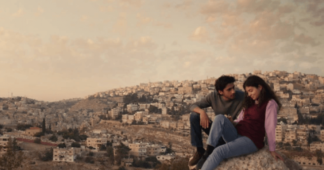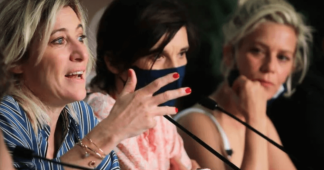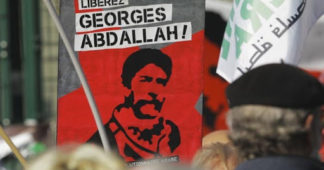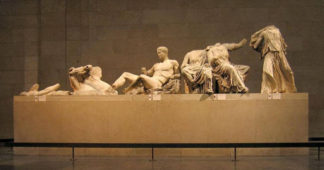Why dd Saudi Arabia ban Palestine scarf at the Red Sea International Film Festival?
Film-makers based in the region and beyond were dismayed by policies at the event, including a crackdown on the keffiyeh
By Joseph Fahim
25 December 2023
The Middle East film-festival schedule has been thrown into disarray since the start of the Israel-Palestine war on 7 October.
Several festivals responded by scrapping their 2023 editions, including Doha’s Ajyal Film Festival, Tunisia’s Carthage Film Festival and the Cairo Film Festival, all in solidarity with Palestine. Meanwhile, the Marrakech International Film Festival in Morocco and Egypt’s El Gouna Film Festival scaled back their presence, with less emphasis on their usual red-carpet bonanza.
But in Saudi Arabia, it was business as usual.
The fourth edition of the extravagant Riyadh Season, which includes more than 8,000 art, music, theatre, food and sports events over several months, remained intact, causing anger at what many said was disrespect given the bloodshed in Gaza, where at least 20,000 people have been killed during the past two months (in contrast it suspended concerts after the death of former Kuwaiti crown prince Nawaf Al-Ahmad Al-Jaber Al-Sabaho).
The Red Sea International Film Festival (RSIFF), which this year took place in Jeddah from November 30 to December 9, is central to the season and is now the biggest film event in the Middle East and North Africa (Mena) region. Launched in 2019, it offers the largest grants for Arab and African film-makers in the region, introducing the global industry to the new talent from the kingdom, which backs the festival through the Saudi Cultural Development Fund.
It is a star-studded event that is only too ready to spend big. Last week, Variety reported that Will Smith had been paid $1m to attend, with Gwyneth Paltrow receiving even more.
Other talent in attendance from Hollywood, Europe, Bollywood and the region included Johnny Depp, Andrew Garfield, Halle Berry, Ranveer Singh, Abdullah al-Sadhan, Michelle Williams, Adrian Brody, Katrina Kaif, Nicolas Cage, Sharon Stone, Burak Ozcivit, Diane Kruger and Jason Statham. The jury was headed by Baz Luhrmann, the two-time Oscar-nominated director of Moulin Rouge! and Elvis.
It also seemed that Palestinian cinema was likewise welcome. The Teacher, Farah Nabulsi’s debut feature, took the Jury Prize as well as best actor for Saleh Bakri, while at the Red Sea Souk Awards, the festival’s industry arm, Golan-raised Ameer Fakher Eldin and Danish-Palestinian Mahdi Fleifel were some of the biggest recipients of grants.
But this welcome, it soon transpired, was in contrast to policies towards the event’s guests.
On 7 December, this writer started to receive messages from film-makers, including Palestinians, regarding what they dubbed “the keffiyeh ban” and alleging that their right of self-expression had been violated. Many sense the move was due to the kingdom’s authorities rather than to the festival itself.
Their observations hint at Saudi Arabia’s surveillance of international visitors, underlining the gulf between the fight for artistic expression and Riyadh’s intolerance, a stance to which stars and industry figures at the festival seemed oblivious.
The attendees, who vary in nationality, industry role and age, spoke on condition of anonymity amid fears for their safety and impact on their careers (Middle East Eye has used pseudonyms rather than their real names). Many believed the ban was at the instigation of the authorities rather than the festival itself.
MEE contacted RSIFF about the allegations cited in this piece, along with the Ritz-Carlton, the Saudi Cultural Development Fund and the Ministry of Foreign Affairs. None had replied at the time of publication.
The keffiyeh: a symbol of Palestine
There was a time when Saudi Arabia imposed strict public dress codes on residents and visitors. But that policy, while still conservative by European standards, has relaxed in recent years: for example, the hijab and the niqab are now optional for Saudi women and visitors alike.
The kingdom has no official law banning the wearing of the keffiyeh, the black-and-white checked Palestinian scarf that came to prominence during the 1936-1939 Arab revolt. It was revived during the 1960s, notably by Yasser Arafat, leader of the Palestinian Liberation Organisation (PLO), as national attire, and is a global symbol of solidarity.
So many of those interviewed by MEE were surprised when they were asked to remove their scarves by security personnel while attending the RSIFF.
“Maha”, an Arab producer who asked that their real name not be used, says that she was asked by a security officer at the Ritz-Carlton Hotel in Jeddah, the festival’s headquarters, to take off her coloured keffiyeh. She sensed that it was an unspoken law and obliged, only to wear it in other places that had less scrutiny.
“I figured from the get-go that this is how it is in Saudi and just went on with it, as dismayed as I was,” said Maha.
“Somaya”, a renowned producer who spoke on condition of anonymity, was less obliging when stopped for wearing a normal-looking scarf, adorned by a small red-and-black rectangle, as they attended a screening. When asked to remove the scarf, Somaya declined, threatened to leave the festival and Saudi Arabia, and demanded to see the guard’s superior. The guard caved in, apologised, and let them through.
Somaya also recounted how another Arab film-maker and strong supporter of Palestine was forced to remove their scarf by a different guard and left in tears.
Some Arab film-makers received advance warning. “Rasha”, who is in her early 30s and attending the festival for the first time, was told by friends about a possible ban. Upon arrival, she went to the industry office.
“The person from the industry desk told us flatly that the keffiyeh was illegal,” said Rasha, who wanted to stay anonymous. “It took us a minute to digest what she said. We asked her again to make sure we didn’t misunderstand, but her response did not leave room for uncertainty.”
Rasha described the general atmosphere of the festival as “uncomfortable” for politically minded film-makers. “The festival owes its guests protection and should be the ones dealing with authorities.”
In a first visit to the festival and Saudi Arabia, “John”, a European director, did not suspect that the keffiyeh would be frowned upon. But at the Ritz Carlton, he was told it remove it. John, who spoke on condition of anonymity, declined: eventually the guard called for back-up and he was intimidated into finally obliging.
But John continued to wear it discreetly and noticed that he was not challenged outside the festival. “I think they saw me as this big white person and thought, just let him pass.”
Palestine, Riyadh and relations
Saudi Arabia and Palestine enjoyed strong relations during much of the past century. King Faisal, who ruled until 1975, was sympathetic towards the Palestinian cause after the wars against Israel in 1967 and 1973. Relations soured during the 1991 Gulf War, when Iraq, supported by PLO leader Yasser Arafat, invaded Kuwait, an ally of Riyadh.
Now Hamas, which controls Gaza, is backed by Iran, Saudi Arabia’s major rival in the region. Saudi Arabia’s powerful Crown Prince Mohammed bin Salman is widely expected to normalise relations with Israel at some point, irrespective of the will of the kingdom’s citizens.
In a country where public protests are illegal, the ban on the keffiyeh is another sign that any form of dissent, as benign as it is, will not be tolerated.
Many guests at the festival did not find the unofficial ban on the keffiyeh and prohibition on Palestine talk as surprising.
The Lodge is the festival’s industry platform, including for talks, workshops and pitching sessions, where film-makers can compete for some of the grants totalling $14m awarded by the festival every year, the largest by any film institution in the region.
But one European producer called the mood of the fair “unnerving” and said that there was “something eerie about the whole proceeding”. There were no official statements as such: instead, participants were told informally by organisers of individual events not to make public statements about Palestine or relate their discussions to events in Gaza.
Maha backed up these allegations: Palestinian film-makers, she said, could only discuss Palestine strictly within the context of their existing projects, although some did express support before pitching.
Some guests told Middle East Eye how they had been placed under surveillance.
One Palestinian producer was stopped for sporting a normal yellow scarf, and noted that a guard was openly talking about the ban.
“He asked his colleague if he was sure that all scarves were prohibited because the instructions that they were given had mainly to do with the outlawing of keffiyehs.”
The producer is convinced that the situation escalated when he told security he was Palestinian and the police were called. “It was a purely Kafkaesque situation,” says the producer, who has dual nationality.
Did they consider making a scene?
“No, because I’m a nobody. If I didn’t comply, they would have thrown me in jail and I might have disappeared because nobody would’ve given a shit about me.”
Later, the producer was warned by a police chief that “things have escalated” and that “the situation needs to be contained”. They were then shown at least 40 photographs, taken at different times, of them wearing the scarf at the hotel.
The Palestinian producer said he did not believe the festival was behind the ban: when entering a mall outside its precincts, he was stopped by a different security guard and forced to remove it. He said many Saudi citizens had expressed solidarity.
“They kept on telling me: ‘Our hearts go out to you’. I always replied: ‘Our hearts go out with you too’.”
Perhaps the most public festival guest to speak out was Farah Nabulsi, who made comments at the awards ceremony on 7 December. Accepting the best actor award on behalf of Saleh Bakri, the British-Palestinian director commented: “Stop the genocide in Gaza. Stop the killing of our brothers and sisters and children in Gaza.”
Last week, she revealed that her second acceptance speech, after she won the Jury Prize, was cut from broadcast. In Jeddah, she told the audience on the night: “Not to address the current devastation in Gaza would be no less than shameful for me.”
Nabulsi observed on Facebook on 12 December: “It seems the live TV stream decided to cut what I was saying and go to commercials, and for their YouTube channel to cut to random empty aerial images with audio only.”
Another film-maker who dared to speak out was Jordanian Mahmoud Al Massad, who has won awards internationally, including at Sundance. Earlier this year, he was given a $40,000 post-production grant by the festival for a documentary feature. But he gave it back a few weeks ago, citing the festival’s failure to acknowledge the bloodshed in Palestine.
Other film-makers who had had their work accepted for screening by the RSIFF subsequently withdrew their films for what one referred to as “the silence of festival over Gaza” – although they themselves refused to go on the record.
But Massad did. “If the monarch of a country dies, wouldn’t you take time to mourn him?” he told Middle East Eye. “If that’s the case, aren’t the lives of the Palestinians as worthy as kings? Aren’t they valuable enough to mourn them?”
Massad said he was speaking out knowing that he would be blacklisted by both the kingdom and the festival. And while, he said, many in the industry support him in private, none would join him in commenting publicly, leaving him shocked and disillusioned.
“Freedom and standing up to what you believe in are the core values of cinema. If we don’t fight for this, then what’s the point of making art? I feel as if they’re buying us now; they’re buying our silence. I refuse to be part of this.”
Film in Saudi Arabia: Thriving amid repression
The RSIFF has been a boon for Mena film-making. Saudi directors and producers have a public space where they can interact with the international film community in a way unparalleled until a few years ago.
Saudi film-makers now have a reputation as some of the most liberal in the Gulf region. Several films from the kingdom have been acquired by Netflix, including, Meshal Aljaser’s Naga, about a wild evening for a drug-popping young woman in the desert; and Mandoob, Ali Kalthami’s drama about the country’s gig economy.
The programmers at the RSIFF have likewise taken daring, if largely unannounced, steps: LGBTQ films last year included Maryam Touzani’s The Blue Kaftan, Fyzal Boulifas’s The Damned Don’t Cry and Dania Bdeir’s short Warsha. This year, sex and nudity, including Johnny Depp’s Jeanne du Barry, were not excised from public screenings.
The event’s programming has nurtured a large and young audience hungry for serious and thought-provoking cinema. This reflects wider Saudi society, which is currently engaged in a love affair with cinema: the kingdom, which had no public screens before 2018, is now the world’s fastest-growing market, with admissions expected to hit $1bn by 2030.
The household names and big money attracted to Jeddah each winter underline the kingdom’s wealth, reach and industry contacts. But that level of influence leads critics of Saudi Arabia to argue that, as with sport, from the sponsorship of golf’s PGA Tour to the purchase of Newcastle Football Club, the approach is intended to distract from the country’s human rights record (although in contrast to buying up sports events and clubs, Saudi Arabia has its own homegrown cinema industry).
For independent Mena film-makers, the generous monetary grants and prospects of work are too tempting to ignore in a notoriously precarious business. Industry professionals likewise cannot risk being denied access to potential work.
Sources who spoke to MEE have alleged that guest lists for the film-criticism symposium excluded any writers or film-makers deemed too noisy on social media (the kingdom and its agencies routinely deny access to state-sponsored public forums for anyone who voices critical opinions).
“My impression is that voices that may have criticised Saudi in the past could still be allowed in, but they would never be given public forums backed by the state,” the source said.
“The state certainly keeps track of who said what about Saudi at any time.”
We remind our readers that publication of articles on our site does not mean that we agree with what is written. Our policy is to publish anything which we consider of interest, so as to assist our readers in forming their opinions. Sometimes we even publish articles with which we totally disagree, since we believe it is important for our readers to be informed on as wide a spectrum of views as possible.











